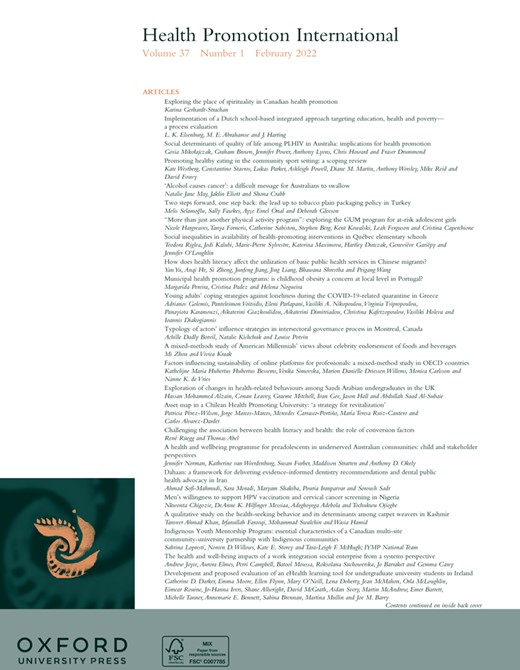-
Views
-
Cite
Cite
Hugh A Shannon, Anthony W Parker, Digital storytelling within the Australian mining industry: worker engagement and health literacy indicator effects, Health Promotion International, Volume 37, Issue 1, February 2022, daab106, https://doi.org/10.1093/heapro/daab106
Close - Share Icon Share
Summary
The mining industry is a demanding context for workplace health education due to a range of factors including productivity targets, workforce diversity and work roster schedules. This project investigated the impact of digital story health communication on worker engagement and its effect on interactive and critical health literacy indicators. The study comprised a quasi-experimental parallel time series research design, with control and intervention groups at each of the mine sites (n = 2). Workers in the intervention group (n = 85) received a ‘toolbox talk’ presentation incorporating a digital story featuring a mining industry worker and a leading cardiovascular health expert. The control group (n = 90) received equivalent health information communicated in a non-narrative manner, reflective of typical practices within the mining industry. A significantly greater effect was evident for worker engagement within the intervention group, with substantial maintenance over the follow-up period, compared with no significant effect at follow-up within the control group. Significant effects on interactive health literacy indicators (n = 3) were evident for the intervention group with corresponding lower level or nil effects within the control group. The findings highlight the benefits of evidence-based digital stories as an efficient and efficacious worker-centred health communication strategy for complex industrial workplace environments.
Lay Summary
This quasi-experimental intervention study sought to test the effectiveness of digital stories featuring mining workers and leading health experts as a workplace health education strategy. The mining industry is a challenging setting for health education due to a range of reasons including productivity targets, workforce diversity and work roster schedules. Workers in the intervention group received a ‘toolbox talk’ presentation including a digital story. Workers in the control group received the same health information without the digital story, reflecting common health communication practices in the industry. Outcomes of this research demonstrate that digital storytelling was more effective on worker engagement and interactive health literacy, with a promising level of maintenance over a follow-up period. The findings show the benefits of digital storytelling as a worker focused health education strategy for complex industrial settings where time efficient communication methods are required.



